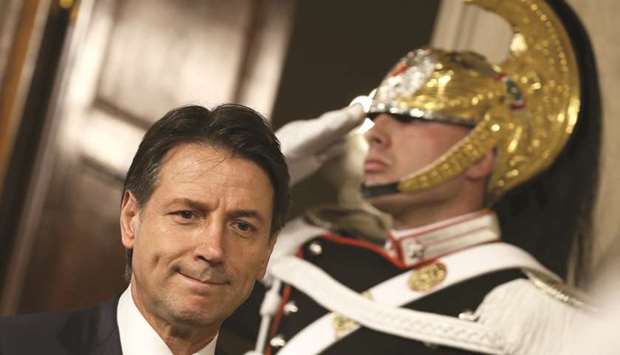Italy’s prime minister-designate Giuseppe Conte has given up on efforts to form a government after the president apparently rejected his pick for the economy ministry, increasing the likelihood of another election taking place this year.
Conte, a little-known law professor with no political experience, took his list of ministers to President Sergio Mattarella in a bid to end a two-month political stalemate.
However, the president rejected Conte’s candidate to the economy ministry, the 81-year-old eurosceptic economist Paolo Savona.
“I have given up my mandate to form the government of change,” Conte announced at a news conference after leaving failed discussions with the Italian president.
Conte thanked the president and the leaders of the 5-Star Movement (M5S) and the League seeking for form a coalition government, “for having put me up as a candidate”.
“I can assure you that I have given the maximum effort and maximum attention in carrying out this task, and I can assure you that I have done so in a climate of full collaboration with the representatives of the political forces that made me candidate,” Conte said.
Before Conte or Mattarella had finished their meeting, far-right League leader Matteo Salvini said that the only option now is to hold another election, probably later this year.
“In a democracy, if we are still in democracy, there’s only one thing to do, let the Italians have their say,” Salvini said in a fiery speech to supporters in central Italy.
Salvini and M5S leader Luigi Di Maio had met Mattarella informally yesterday to try to find a solution, a coalition source said.
Mattarella is expected to speak soon about his decision.
“The problem is Savona,” the coalition source said, explaining that the economist had not sufficiently softened some of his more eurosceptic positions.
Yesterday Savona tried to allay concerns about his views in his first public statement on the matter.
He has been a vocal critic of the euro and the European Union, but he has distinguished credentials, including as industry minister in the early 1990s.
“I want a different Europe, stronger, but more equal,” Savona said in a statement.
Last week Savona’s known criticism of the euro and German economic policy further spooked financial markets that were already concerned about the future government’s willingness to reign in the massive national debt, worth 1.3 times its annual output.
Outgoing Economy Minister Pier Carlo Padoan said yesterday that the problem was not Savona, but the coalition’s economic plan, which is “clearly unsustainable”.
He also said that the parties should have vocally ruled out a proposal put forward in Savona’s most recent book, which said Italy should draw up a “plan B” for the country to leave the eurozone with as little damage as possible if it should prove necessary.
In his statement, Savona said that his position on debt was the same as that forged by the potential coalition allies in their programme – which says it will be reduced not through austerity or tax cuts, but through targeted investments and policies that boost economic growth.
Savona has had high-level experience at the Bank of Italy, in government as industry minister in 1993-94, and with employers’ lobby Confindustria.
However, his critical stance on the euro has been the focus of concern.
In yesterday’s statement Savona did not refer to his opinions on the euro, but more than 70 slides outlining a “plan B” for Italy’s exit from the euro, co-authored by Savona in 2015 with a dozen others, circulated on social media.
If the president were to continue to veto Savona, the risk is that the deal holding together the two rival parties, which won the most parliamentary seats in the March vote, would fall apart, making another election this year likely.

Conte: I have given up my mandate to form the government of change.
